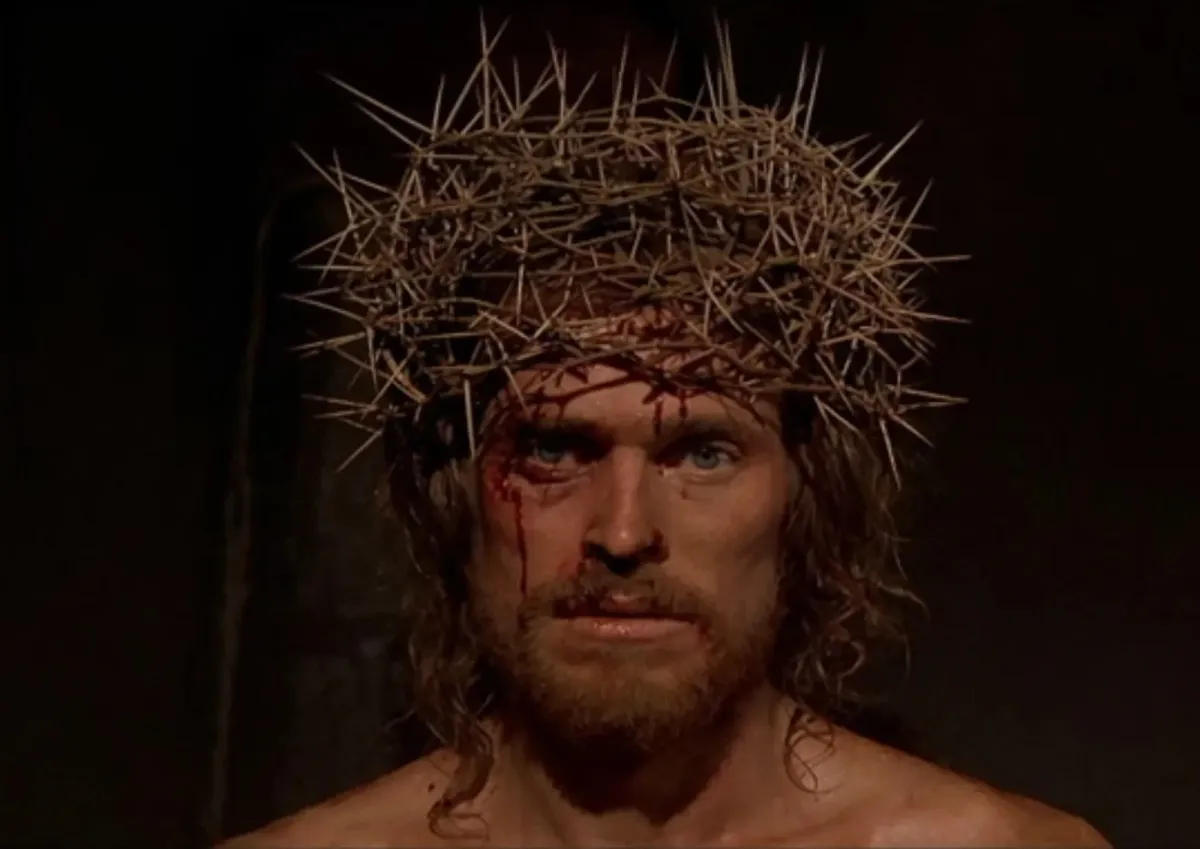The best Jesus movie emphasizes his humanity and frailty
How Martin Scorsese figured out how to make a non-boring movie about Jesus.

For being one of the most significant figures in human history and the central figure of one of the world's biggest religions, Jesus Christ sure has a lousy track record for having good movies and TV series made about him. Sure, there are plenty of adequate-to-good movies about Jesus, but even some of the best adhere to the text of the New Testament so slavishly that they feel slightly like museum pieces the second they're released. Jesus is perhaps best utilized as a supporting character in others' stories, as with Ben-Hur or Jesus Christ Superstar (where Judas is the lead and I will not hear otherwise).
What's most common with Jesus movies is evident in Nicholas Ray's 1961 film King of Kings. Ray is incapable of making a truly boring film, but King of Kings seems at times like he's seeing how close he can come to doing so. Everything is stentorian and overly affected, even the best performances smothered under several layers of making sure the film doesn't make any Christians of any denomination mad. The film is so distracted by the idea of Jesus as a god that it fails to make sense of him as a man.
There's a simple reason for the strain, I think. Most depictions of the life of Christ strive to fidelity with at least one of the four gospels, and when you read the gospels with the eye of someone trying to adapt them to the screen, you find yourself wondering about character motivations, about why anything that's happening happens. If you've been steeped in church teachings from infancy (as I was), you'll have a whole host of explanations for those questions at the ready. But if you just try to read the book cold, it becomes all the more clear that it is fundamentally a religious text and therefore not really subject to the same rubrics we'd place upon a work of fiction. In a religious text, the gods rarely have to justify themselves because they are gods; in, say, a movie, we want a little more meat on the bone.
The best faithful adaptation of the gospels is Pier Paolo Pasolini's 1964 film The Gospel According to St. Matthew, which takes great pains to adapt the titular gospel as faithfully as possible. Pasolini was a gay atheist Marxist, but he had grown up Catholic. The tension between those two versions of himself is what gives the film its juice. St. Matthew is a film deeply invested in the enormous gap between what Jesus preached and what the world has made of those preachings. It is the kind of movie only a non-believer who used to believe can make, and I suspect that's why it retains its power all these decades later. It treats the text of the gospel and Jesus himself with great reverence, but that reverence coats a disdain for what the church has become. It has, in other words, a take, which is what too many Jesus movies lack.
The other best Jesus movie had to break free of the Bible entirely. I speak, of course, of Martin Scorsese's 1988 masterpiece The Last Temptation of Christ, based on the novel by Nikos Kazantzakis. (If you have never seen it, it's worth purchasing in this beautiful set collecting Scorsese's loose trilogy of films with religious themes.)
Upon its release, Last Temptation was treated with harsh recrimination by various church leaders across all manner of denomination. Much of the pushback was centered on the fact that the film ends with a lengthy dream sequence where Satan offers Jesus a way down off the cross, an exit route from the whole "you must die to save the world" thing that's such a bummer. In the midst of this, ahem, last temptation, Jesus (played by Willem Dafoe) marries Mary Magdalene and has children with her. He gives up on what is divine about himself in the name of enjoying the simple pleasures of a domestic life. Every so often, his old buddy Judas comes by to rail at him about how he abandoned their revolutionary project, but Jesus doesn't care. He's happy to grow old and have a normal life, without the burden of the lives of every human being who has ever or will ever live on his shoulders.
(Sidebar: Every TV show has done an It's a Wonderful Life episode, but not enough have done Last Temptation episodes. Honestly, only The X-Files comes to mind. Possibly the final Desmond episode of Lost? Sort of? Get on this, TV writers! I guess I'm addressing myself here!)
The film ends with Jesus rejecting this temptation and returning to the cross to die. "It is accomplished," he cries, and then the entire movie seems to dissolve out from underneath him. This moment is thanks to one of the most serendipitous fuck-ups in film history. An assistant opened the camera on this shot before the film had been properly sealed away, exposing much of it to light that corrupted the frames. In editing, Scorsese decided that this take could stand in for the resurrection, not directly depicting it but, instead, suggesting it. Whatever happens to Jesus after death, it's so monumental that it's not met for the camera. It's a great deal more artistic and beautiful than this.
Consider becoming a paid subscriber: For as little as $5 a month, you can support this newsletter and help keep it rolling. Paid subscribers get weekly posts on Mondays and Fridays that go out even on weeks the Wednesday newsletter is dark, access to the full archives, a monthly mailbag, and a link to the Episodes Discord server. There will be other fun treats along the way. Click the button to learn more!
The genius of Last Temptation's conceit is that instead of centering Jesus's divinity, it centers his humanity. If you believe that Christ was both God and man, then you have to assume he was constantly fighting against his human frailty to preserve his divinity. After all, most Christian denominations believe he had to be completely sinless to stand in as an adequate sacrifice for humanity. As a matter of doctrine, this makes sense, but it has too often led to a deep and abiding belief that Jesus didn't just sin but was rarely – if ever – tempted to sin. For too many Christians, a kind of self-defeating doublethink sets in where the temptation itself is almost as bad as the sin. Yet the whole point is that one might be tempted to lie or commit adultery or kill, then overcome the temptation and remain blameless.
What's more, the Bible spends a great deal of time on a story about Jesus being tempted by the devil while in the desert. In his novel, Kazantzakis simply assumes that the devil was always lurking in Jesus's life, trying to get him to stray from the extraordinarily narrow path laid out for him. In the final moments of his life, when Jesus feels most abandoned by God, the devil takes one last shot at ensnaring his soul. In both novel and film form, it nearly works before Jesus realizes his divine purpose is too great. He's meant to save everybody, and he cannot stray from that mission.
Scorsese is one of our great chroniclers of desire and frailty. His movies so often center on men who live outside society's codes in ways they believe are freeing but which ultimately imprison them in ways that can be both literal and more metaphorical. (Think, for instance, of the protagonist's final fate in Goodfellas for an example of a film that does both.) In his faith films, however, Scorsese flips the script. In these films, the protagonists are constantly working to overcome their basest selves, and doing so is just as much of a prison as any that his more antiheroic characters create for themselves. His 2016 film Silence is the most potent example of this, but Last Temptation posits that for Jesus to succeed in his mission, he must deny himself so many very simple things that can make life worth living, things that God himself purports to be in favor of. Catholic that he is, Scorsese cannot help but be moved by that self-denial, even as he understands it to be excruciating.
Much of the organized pushback to Last Temptation arose out of what we would now recognize as evangelical churches, and a lot of that pushback either grossly misrepresented the film or outright lied about what was in it. Few articles from that perspective pointed out that Jesus's marriage occurred within a dream sequence, for instance. (Also, a lot of the evangelical pushback was subtly anti-Catholic because of course it was.)
Yet when I look at the Jesus who exists within the evangelical church now, he seems a centerless, rudderless figure, easily warped and shaped by the political moment. Thus, the American evangelical church ceases to be very much about Christ and much more about the Republican president of the moment. When you remove Jesus's humanity and make him only a god, you turn him into a figure who is constantly, tacitly giving you support for even the very worst things you want to do. Yet if you remind yourself that he was also a man, also tempted by all of the same things that tempt any of us, you begin to better understand the religious and moral teachings he was trying to impart to the world.
I suspect The Last Temptation of Christ bears a special power for Christians (or those raised in the church). Indeed, I try to watch it every year around Easter. But what makes both it and Pasolini's film powerful watches for even non-believers is the way the projects examine the impossible mystery at the heart of the Christian faith. If Jesus was both god and man, then erasing either half of that equation erases part of who he is as a character. Erasing either half of that equation is, in effect, to erase some part of ourselves, whether the part that knows better or the part that too often gives in to what we know is wrong. Scorsese and Pasolini understand that the Jesus of the Bible was a man not just walking a narrow path but a tightrope. To deny him the difficulty of that is to deny much of what makes Christianity so powerful and mysterious and even scary. Last Temptation and St. Matthew live in the mystery, in the darkness between crucifixion and resurrection. More stories of Jesus's life and death could afford to explore those shadows.
A Good Song
The free edition of Episodes, which (usually) covers classic TV and film, is published every other Wednesday, and the subscriber-supported edition of Episodes, which covers more recent stuff, is published every Friday. Paid subscribers also have access to the weekly Monday Rundown. This newsletter is written by Emily St. James and Libby Hill. If you have suggested topics, please reply to the email version of this newsletter or comment (if you are a paid subscriber).




